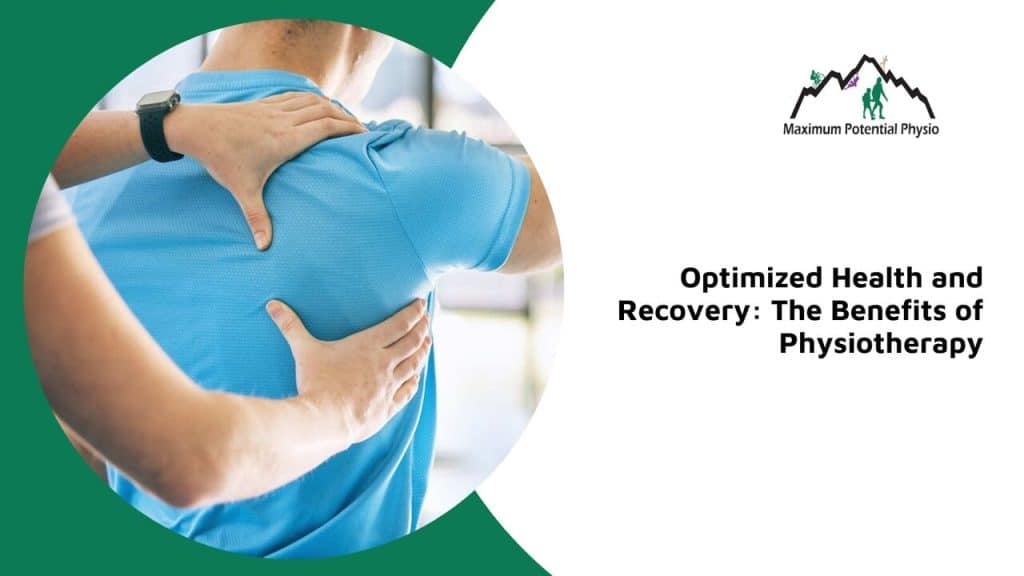Optimized Health and Recovery: The Benefits of Physiotherapy

Physiotherapy offers a wide range of benefits, from pain relief to improved mobility, for people of all ages and activity levels. Whether you're recovering from an injury, managing a chronic condition, or simply looking to enhance your physical health, physiotherapy can provide long-term solutions that go beyond temporary relief. Through a combination of personalized exercises, manual therapy, and education, physiotherapy empowers you to regain function, prevent future injuries, and maintain a healthy lifestyle. In this article, we’ll explore the key benefits of physiotherapy, the conditions it treats, and the most effective techniques used in treatment.
How Physiotherapy Benefits Health and Well-Being
Physiotherapy offers numerous benefits for people of all ages and activity levels. Here are some of the key advantages:
- Pain Relief Without Medication: One of the most significant benefits of physiotherapy is its ability to relieve pain without the need for medication. Techniques such as manual therapy, exercise, and heat or cold applications can reduce inflammation, improve circulation, and address the underlying cause of pain. This makes physiotherapy an excellent option for those who prefer drug-free treatments.
- Improved Mobility and Flexibility: Whether you're recovering from surgery, an injury, or dealing with a chronic condition, physiotherapy helps restore range of motion and flexibility. Exercises and stretches prescribed by a physiotherapist are designed to improve joint mobility and muscle flexibility, making daily activities easier and more comfortable.
- Injury Prevention: Physiotherapy not only helps in recovery but also plays a key role in injury prevention. By identifying and addressing muscle imbalances, weaknesses, or poor movement patterns, physiotherapists can help you avoid future injuries. This is especially beneficial for athletes or individuals with physically demanding jobs.
- Rehabilitation After Surgery: After surgery, particularly orthopedic procedures such as joint replacements or ligament repairs, physiotherapy is essential to regain strength and function. A physiotherapist will guide your recovery, helping you safely return to your normal activities while minimizing the risk of complications.
- Improved Posture and Balance: Poor posture and balance can lead to chronic pain and increase the risk of falls, especially as we age. Physiotherapy helps correct posture issues, strengthens stabilizing muscles, and improves balance, making it easier to move confidently and safely.
- Management of Chronic Conditions: For those living with chronic conditions such as arthritis, fibromyalgia, or chronic back pain, physiotherapy offers ongoing management solutions. By improving muscle strength, flexibility, and endurance, physiotherapy can help reduce pain and enhance quality of life.
Conditions Physiotherapists Can Treat
Physiotherapy is a versatile treatment approach used to manage a wide range of conditions affecting individuals of all ages. Some of the most common conditions treated by physiotherapists include:
- Sports Injuries: Sprains, strains, ligament tears, and other injuries sustained during physical activities can be effectively managed with physiotherapy. Treatment focuses on reducing pain, restoring mobility, and preventing re-injury.
- Back and Neck Pain: Poor posture, muscle strain, or injury can lead to chronic back or neck pain. Physiotherapy uses a combination of manual therapy, exercise, and posture correction to relieve discomfort and improve function.
- Arthritis: Individuals with osteoarthritis or rheumatoid arthritis can benefit from physiotherapy to reduce joint stiffness, improve mobility, and strengthen the muscles around affected joints.
- Post-Surgical Recovery: After surgeries like knee replacements or ACL repairs, physiotherapy plays a vital role in helping individuals regain strength, flexibility, and joint function.
- Chronic Pain Conditions: Chronic pain, such as that caused by fibromyalgia or chronic fatigue syndrome, can be managed through low-impact exercises and manual therapy to reduce pain and improve physical endurance.
- Balance and Coordination Problems: For those with balance issues, particularly older adults, physiotherapy helps improve stability and coordination, reducing the risk of falls and injuries.
Exploring Beneficial Physiotherapy Techniques
Physiotherapists use a variety of techniques, tailored to each individual’s needs, to promote healing, reduce pain, and restore function. Some of the most beneficial physiotherapy techniques include:
- Manual Therapy: This hands-on approach involves the physiotherapist using their hands to mobilize joints, manipulate soft tissue, and stretch muscles. Manual therapy can improve joint mobility, reduce pain, and increase circulation, facilitating the body’s natural healing process.
- Therapeutic Exercises: Physiotherapists design specific exercise programs tailored to an individual's condition and recovery goals. These exercises help strengthen muscles, improve flexibility, and enhance overall physical function. Regularly performing these exercises can accelerate recovery and prevent future injuries.
- Heat and Cold Therapy: Heat therapy increases blood flow, reduces muscle tension, and promotes relaxation, while cold therapy helps reduce swelling and numb pain. Physiotherapists often use these modalities to manage pain and inflammation after an injury.
- Postural and Gait Training: For individuals with poor posture or gait abnormalities, physiotherapists provide training to correct alignment and improve movement patterns. This technique is particularly beneficial for those recovering from surgery or dealing with chronic pain caused by poor biomechanics.
- Dry Needling: Dry needling involves inserting fine needles into trigger points (tight areas within muscles) to release tension and relieve pain. This technique can be highly effective for treating muscular pain, especially in conditions like chronic neck or back pain.
Is Physiotherapy Beneficial for Athletes?
Yes, physiotherapy is highly beneficial for athletes, whether they are recovering from an injury or aiming to enhance their performance. Athletes put significant stress on their bodies, often leading to muscle imbalances, overuse injuries, or acute injuries like sprains and strains. Physiotherapy helps athletes maintain optimal physical health by addressing these issues early and preventing further damage.
For injured athletes, physiotherapy focuses on reducing pain, restoring range of motion, and strengthening muscles to prevent re-injury. A physiotherapist will create a personalized rehabilitation plan that aligns with the athlete’s specific needs and sport, ensuring a safe return to training and competition.
Even athletes who are not injured can benefit from physiotherapy. By identifying areas of weakness or tightness, physiotherapy helps correct movement patterns, improve flexibility, and optimize athletic performance. Many athletes also use physiotherapy for injury prevention, as physiotherapists can create exercise routines that strengthen vulnerable areas, helping reduce the risk of future injuries.
Can Physiotherapy Help with Pregnancy-Related Discomfort?
Yes, physiotherapy can be extremely beneficial for managing pregnancy-related discomfort. Pregnancy brings many physical changes, including increased weight, shifting posture, and pressure on the spine and joints, which can lead to lower back pain, pelvic pain, and joint discomfort. Physiotherapists who specialize in prenatal care can provide safe, gentle treatments to alleviate these common pregnancy issues.
Physiotherapy can help pregnant women by:
- Relieving Back and Pelvic Pain: Gentle manual therapy, stretching exercises, and posture adjustments can ease back pain and reduce pressure on the pelvis.
- Improving Core Strength: Strengthening the core muscles, including the pelvic floor, helps support the spine and reduce the risk of pain and discomfort as the pregnancy progresses.
- Enhancing Flexibility and Mobility: Physiotherapy exercises can help pregnant women stay active and mobile, reducing stiffness and promoting a smoother pregnancy.
- Preparing for Labor: Physiotherapists can guide expectant mothers through specific exercises that prepare the body for labour and delivery, making the birthing process easier and reducing the risk of complications.
Postnatal physiotherapy is also beneficial in helping women recover after childbirth by addressing issues like diastasis recti (abdominal muscle separation) and pelvic floor dysfunction. Overall, physiotherapy offers a safe and effective way to manage the physical demands of pregnancy and support a healthy, active lifestyle during this time.
How Often Should You Attend Physiotherapy Sessions?
The frequency of physiotherapy sessions needed to see results depends on several factors, including the severity of your condition, your goals, and your overall health. For those recovering from an injury or surgery, more frequent sessions (one to two times per week) are typically recommended at the beginning of treatment to accelerate healing and monitor progress closely.
As your condition improves, the frequency of visits may be reduced, with many individuals moving to maintenance therapy once every few weeks or months. If you’re managing a chronic condition, you may benefit from regular physiotherapy to prevent flare-ups and maintain strength and mobility.
It’s important to follow your physiotherapist’s recommendations and be consistent with at-home exercises to achieve optimal results. Physiotherapy is not a quick fix—it works best when incorporated into your routine, allowing for gradual and sustained improvement.
Find the Relief You’ve Been Looking For
Ready to experience the transformative benefits of physiotherapy? Whether you're an athlete aiming to boost performance, recovering from surgery, or managing chronic pain, physiotherapy can help you achieve your health goals.
At Maximum Potential Physiotherapy in Calgary NW, our team is committed to providing personalized care that supports your recovery and long-term well-being. Contact us today to schedule your appointment and take the first step toward a pain-free, active life!

